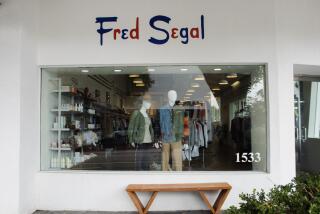L.A. Gear Trims 60% of Local Staff
Trying to outrun slumping revenue and a soft market for athletic shoes, L.A. Gear Inc. on Monday said it laid off 60% of its 102 Santa Monica-based employees.
The company also said its president, Bruce MacGregor, resigned.
The layoffs, which affect all departments, are an effort to “streamline the operation,” Chairman and CEO David Gatto said in a statement. Gatto was named to head the struggling athletic footwear and apparel company three weeks ago.
Company officials declined to elaborate on the layoffs or on MacGregor’s departure.
Santa Monica-based L.A. Gear has reported 11 consecutive quarterly losses amid a decline in demand for its footwear. Last week, it reported a net loss for the nine-month period ended Aug. 31 of $21.5 million.
Gatto said company management is working to develop new strategies to chart the company’s future.
An industry analyst who requested anonymity said layoffs might be part of a plan to reduce the company’s involvement in manufacturing. He said the company might be planning to license its name to contractors.
“They haven’t had a strong-selling product for years,” the analyst said. “Their only hope is to do something drastic.”
In October, Los Angeles-based PCH Investments purchased a 42% stake in the company and named Gatto chairman.
Begun as a shop on Melrose Avenue in 1982, L.A. Gear grew into a star mover in the athletic apparel industry by the late 1980s, with its colorful high-top sneakers that attracted teenage girls. At one point it was the nation’s third-best-selling athletic shoe brand, after Nike Inc. and Reebok International.
Said Gatto: “This obviously is a very difficult time for the company and its hard-working employees.”
Prior to Monday’s announcement, L.A. Gear had a total of 212 employees in the U.S. and five other countries.
Shares of L.A. Gear fell 6 cents to close at $1.06 on the New York Stock Exchange.
More to Read
Inside the business of entertainment
The Wide Shot brings you news, analysis and insights on everything from streaming wars to production — and what it all means for the future.
You may occasionally receive promotional content from the Los Angeles Times.










